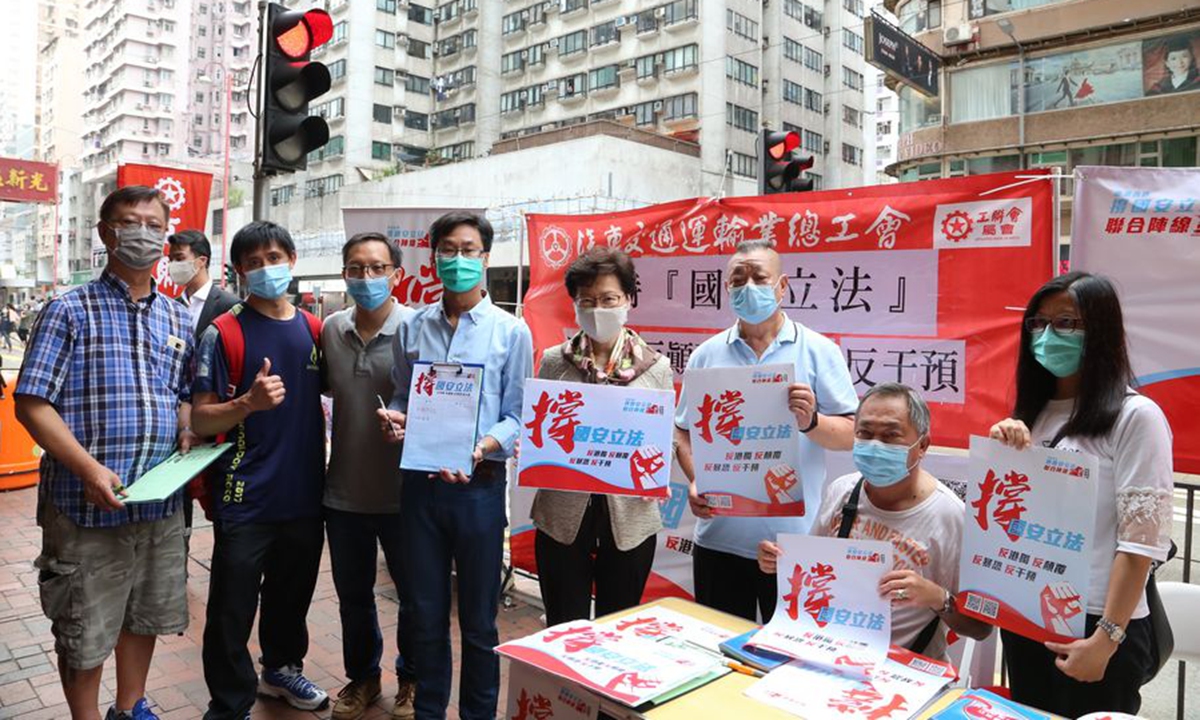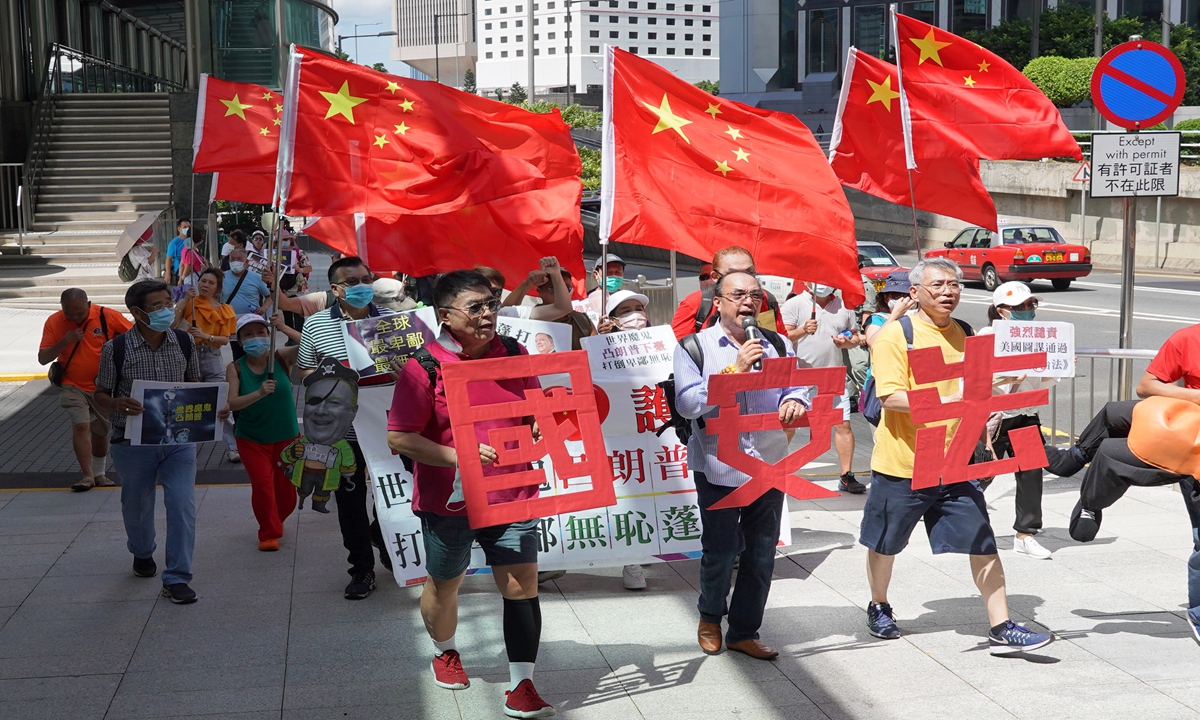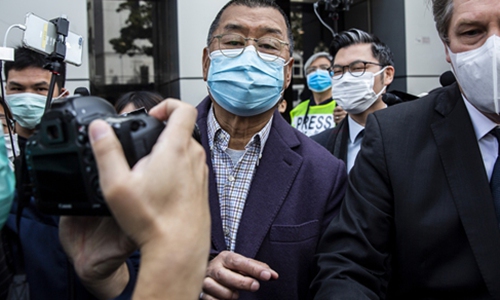China slaps sanctions on US troublemakers ahead of natl security law vote
Beijing to vote on national security bill for HK on Tuesday

Chief Executive of the Hong Kong Special Administrative Region Carrie Lam visits a street stand and signs a petition in support of the national security legislation in Hong Kong on May 28. Photo: Xinhua
This is a developing story. We will update it later.
Ahead of the final voting procedure to enact the national security law for Hong Kong, China announced visa restrictions on US personnel on Monday - a sign that China rejects firmly foreign interference in the Hong Kong affairs.
Taking such concrete steps to accelerate the passage of the law while slashing US influence reflects China's unshakable determination to safeguard its sovereignty and national security, and China's will against US' ambitions to make Hong Kong a strategic Western chess piece, observers said.
The Chinese government will impose visa restrictions on US personnel who have "behaved badly" on Hong Kong-related issues, Foreign Ministry spokesperson Zhao Lijian told a routine press conference on Monday.
The decision was announced following growing pressure from the US government on China over Hong Kong, as the US Senate recently passed the Hong Kong Autonomy Act. The latest US act calls for mandatory sanctions against any person responsible for "undermining Hong Kong's autonomy."
The Chinese countermeasure also comes ahead of the voting by China's top legislature body on the national security law for Hong Kong on Tuesday.
"The US attempt to block China's efforts to advance the national security legislation for Hong Kong through so-called sanctions is doomed to fail," Zhao said.
When asked who would be targeted by China's new countermeasures, the spokesperson said that relevant people know who they are.
US Secretary of State Mike Pompeo announced on Friday visa restrictions on incumbent and former Chinese officials "responsible for eviscerating Hong Kong's freedoms," and their family members may also be affected. What Pompeo said drew a backlash from China, as authorities, including the Chinese Embassy in the US and the government of the Hong Kong Special Administrative Region (HKSAR), strongly oppose the US act.
Pompeo, Assistant Secretary of State for East Asia and Pacific Affairs David Stilwell and major sponsors of the Hong Kong-related acts could be on the list of China's visa countermeasures, according to Lü Xiang, a research fellow on US studies at the Chinese Academy of Social Sciences in Beijing.
The Hong Kong Autonomy Act was introduced by Chris Van Hollen, the Democratic senator from Maryland, and was co-sponsored by some major American hawks, who have long held a hostile attitude toward China, such as Ted Cruz and Tom Cotton.
Also on the list could be some people from the US consulate general in Hong Kong, such as Julie Eadeh, its political unit chief, who frequently met with leaders of violent Hong Kong rioters like Joshua Wong and Martin Lee Chu-ming, Li Haidong, a professor at the Institute of International Relations of the China Foreign Affairs University, told the Global Times on Monday.
Some netizens also suggested including into China's sanction list other American hawks like Josh Hawley, Marco Rubio and Nancy Pelosi, considered "instigators" of chaos and disruption in the HKSAR.
Some observers also noted that visa restrictions are just the beginning of the Chinese countermeasures to US sanctions, which would grow as long as the US imposes more sanctions. The scope of the visa restrictions would also include Hong Kong and Macao, Li said, as both the SARs are parts of China.
Those who shelter and collude with the US personnel would likely be put on the sanctions list, observers said.

A Hong Kong association gathers at Chater Garden, Central Hong Kong, in support of the national security legislation in the city. Dozens of participants marched to the US Consulate General in Hong Kong waving the Five-Starred Red Flag and shouting slogans supporting the legislation and protesting the US' interference in China's internal affairs. Photo: cnsphoto
Ready to vote
The draft of the national security law for Hong Kong was submitted on Monday to the ongoing session of China's top legislature body, with more details of the law expected to be released soon. The new law will mention and define the specific targeted criminal activities which threaten national security. The upcoming law is justified as its political and legal legitimacy can stand the historical test, observers said. And it won't change the way people live in Hong Kong or deprive the legitimate rights they enjoy under "one country, two systems" and the Basic Law.
Central authorities would only exercise criminal jurisdiction within a limited scope, while the majority of cases relevant to the anti-extradition bill movement would be handled by the Hong Kong law enforcement system, experts said.
When it comes to penalties, some legal experts, echoing several Hong Kong deputies to the National People's Congress (NPC) who suggested that those violating the law would face up to a 10-year jail term or longer, said any sentence would depend on the severity of the offense.
Two experts who also took part in consultations for the law confirmed that the law would target only four types of crimes: acts of secession, subversion of state power, terrorist activities and collusion with foreign forces - while fully respecting the independent judiciary and law enforcement of the HKSAR and individual rights under the Basic Law. After the law is enacted, most Hong Kongers shall continue to enjoy a number of freedoms, including freedom of speech, of assembly, of demonstration, and freedom to strike.
Though the upcoming law has not disclosed details on the four types of crimes, including the standards of conviction and relevant penalties, some Hong Kong media outlets, citing deputies and sources close to the matter, reported that the law won't have any retroactive effect, unless the criminal act is of a continuing nature, as more extreme activists and opposition group leaders showed concern over whether cases related to the anti-extradition bill movement since June 2019 would also be handled. Wong Kwan-yu, a Hong Kong deputy to the NPC, was quoted as saying in a report by hk01.com on Sunday that it is reasonable to impose a life sentence.
Though there is no mention of any retroactivity in the upcoming law, if the cases involving riots go beyond the scope of local law enforcement agencies, they could be handled by central agencies, and the new law could apply retroactively to these cases, as the riots are not a past event but still ongoing, some legal experts suggested.
Tam Yiu-chung, a member of the NPC Standing Committee, told media in a previous interview that mild offenses would carry a sentence of about three years, while more severe ones would entail jail terms of from five to 10 years.

Hong Kong riot supporter Jimmy Lai (center) leaves the Kowloon City police station in Hong Kong on Friday after being arrested for taking part in an unauthorized assembly on August 31, 2019. Photo: AFP
Details to come out
"Any adjustment to the sentence would depend on the severity of the offense. The law should be a powerful deterrent, and the penalty should be balanced, as a felony can't be given a mild sentence," Tian Feilong, a Hong Kong affairs and legal expert at Beihang University in Beijing, told the Global Times on Monday.
The maximum sentence of the mainland's national security law is death, which would be used only as a reference by the national security law for Hong Kong. "The maximum sentence would be life imprisonment," Tian said.
While some Western and local media outlets reported that the upcoming law would deter speech and critics, observers noted that the law won't punish those who criticize the government, unless they're subversive in nature.
The law will punish very few types of severe criminal acts, some legal experts said. However, slogans and claims calling for "Hong Kong independence" and hatred toward the nation would not be tolerated.
Other experts also suggested that when the law takes effect, chanting pro-independence slogans or songs during the protests such as 'liberate Hong Kong, the revolution of our times' or 'glory to Hong Kong' or waving foreign flags to beg for help from other countries during protests would be considered acts of secessionism, and those acts would be punished.
Rumors rebutted
Some extreme activists such as Wong and Lai would be the prime targets of the national security law for Hong Kong, who are likely to be arrested as soon as the law takes effect on Wednesday, some media reported, which some observers denied.
"The law will require a full process of obtaining evidence... Some rumors are too exaggerated," Li Xiaobing, an expert on Hong Kong, Macao and Taiwan studies at Nankai University in Tianjin, told the Global Times on Monday.
The majority of cases involving social turmoil since last summer would be handled by public security ordinances and other relevant laws in Hong Kong, while the new national security law for Hong Kong would only target those who continue to collude with foreign forces, Li noted.
- HK security bill passed on Tuesday: HK media
- National security law will be new start for HK: Global Times editorial
- Chinese adaptation of Singaporean drama ‘The Little Nyonya’ ignites heated discussion among viewers of the original
- Beijing deploys “tank-like” droid to make disinfection work smarter and safer